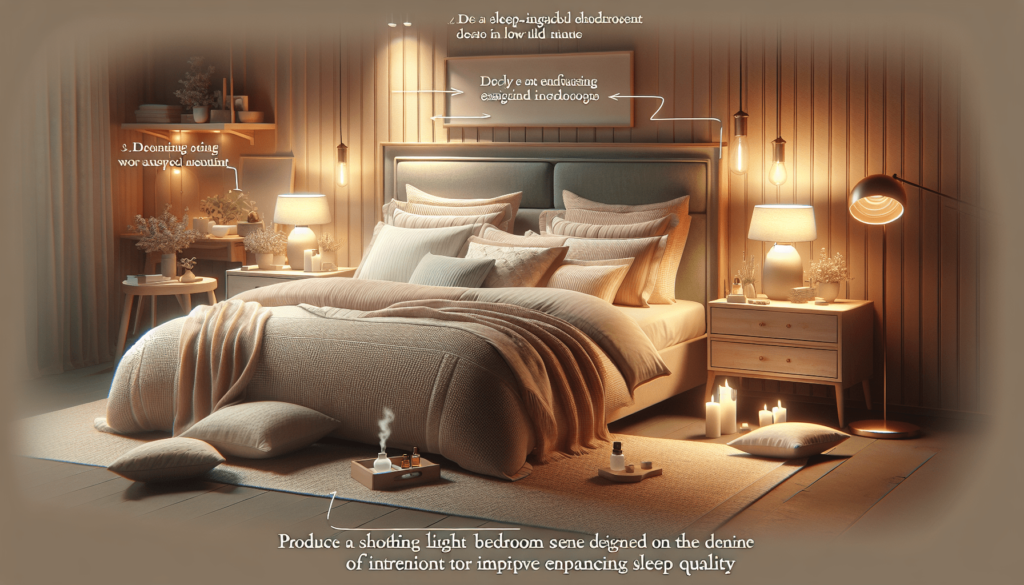Have you ever struggled to get a good night’s sleep? If so, you’re not alone. Many people face challenges when it comes to falling asleep and staying asleep. However, there are holistic approaches you can take to enhance the quality of your sleep. In this article, I’ll explore different methods and techniques you can incorporate into your bedtime routine to help you achieve a more restful night’s sleep.
Understanding the Importance of Sleep
Sleep is crucial for your overall health and well-being. It allows your body to rest and recharge, repair tissues, consolidate memories, and regulate mood. When you don’t get enough quality sleep, it can have a negative impact on your physical, mental, and emotional health. Understanding the importance of sleep is the first step towards improving your sleep quality.
Why Do You Need Quality Sleep?
“Your body needs quality sleep to perform at its best. It helps you stay focused, alert, and energized throughout the day. Without enough sleep, you may experience difficulties with concentration, memory, and decision-making. Quality sleep is essential for maintaining a healthy lifestyle and overall well-being.”
Factors Affecting Sleep Quality
There are various factors that can affect the quality of your sleep. Identifying these factors can help you make positive changes to improve your sleep hygiene.
External Factors
“External factors such as noise, light, temperature, and your sleep environment can impact the quality of your sleep. Creating a sleep-friendly environment by reducing noise, blocking out light, and maintaining a comfortable temperature can help you achieve a more restful night’s sleep.”
Internal Factors
“Internal factors like stress, anxiety, and health conditions can also influence your sleep quality. Finding healthy ways to manage stress, practicing relaxation techniques, and addressing any underlying health issues can significantly improve your sleep patterns.”

Holistic Approaches to Enhancing Sleep Quality
When it comes to improving your sleep quality, taking a holistic approach can yield long-lasting benefits. Holistic practices focus on treating the whole person – mind, body, and spirit – rather than just the symptoms of sleep disturbances. Here are some holistic approaches you can consider incorporating into your bedtime routine:
Mindful Meditation
“Mindful meditation is a practice that involves focusing your attention on the present moment without judgment. It can help calm your mind, reduce stress and anxiety, and promote relaxation – all of which are essential for quality sleep.”
Yoga
“Yoga combines physical postures, breathing techniques, and meditation to improve flexibility, strength, and mental well-being. Practicing yoga before bedtime can help relax your body and mind, making it easier to fall asleep and stay asleep.”
Aromatherapy
“Aromatherapy uses essential oils to promote relaxation, reduce stress, and improve sleep quality. Scents like lavender, chamomile, and bergamot have been found to have calming effects that can enhance your sleep experience.”
Herbal Remedies
“Herbal remedies like valerian root, passionflower, and chamomile tea have been used for centuries to treat insomnia and promote relaxation. These natural remedies can be a gentle and effective way to improve your sleep quality without the use of prescription medications.”
Lifestyle Changes for Better Sleep
In addition to holistic practices, making positive lifestyle changes can also contribute to better sleep quality. Here are some simple adjustments you can make to support healthy sleep habits:
Establish a Consistent Sleep Schedule
“Going to bed and waking up at the same time every day helps regulate your body’s internal clock and improve the quality of your sleep. Consistency is key when it comes to establishing healthy sleep patterns.”
Limit Screen Time Before Bed
“The blue light emitted from electronic devices like smartphones, tablets, and computers can interfere with your body’s production of melatonin, a hormone that regulates sleep. Limiting screen time before bed can help you relax and prepare your body for sleep.”
Regular Exercise
“Regular physical activity can help you fall asleep faster and enjoy deeper, more restorative sleep. Aim for at least 30 minutes of moderate exercise most days of the week to promote better sleep quality.”
Healthy Eating Habits
“Maintaining a balanced diet and avoiding heavy meals close to bedtime can support better sleep quality. Limiting caffeine and alcohol consumption, especially in the evening, can also help you sleep more soundly.”

Creating a Relaxing Bedtime Routine
Establishing a relaxing bedtime routine can signal to your body that it’s time to wind down and prepare for sleep. Consistency is key when it comes to creating a bedtime routine that promotes restful sleep. Here are some ideas for incorporating relaxation techniques into your evening routine:
Dim the Lights
“Dimming the lights in your bedroom can help stimulate the production of melatonin, the hormone that regulates sleep. Creating a soothing ambiance with soft lighting can signal to your body that it’s time to relax and unwind.”
Take a Warm Bath
“Taking a warm bath before bed can help relax your muscles, lower your body temperature, and promote a sense of calm. Adding Epsom salts or essential oils like lavender can enhance the relaxing effects of your bath.”
Read a Book
“Reading a book before bed can help distract your mind from daily stressors and promote relaxation. Choose a calming, enjoyable book to read before turning off the lights for the night.”
Practice Deep Breathing
“Deep breathing exercises can help reduce stress, calm your mind, and prepare your body for sleep. Try taking slow, deep breaths in through your nose and out through your mouth to promote relaxation.”
Sleep Hygiene Tips for Better Sleep
In addition to holistic approaches and lifestyle changes, practicing good sleep hygiene is essential for improving the quality of your sleep. Sleep hygiene refers to the behaviors, habits, and environmental factors that can impact your sleep quality. Here are some sleep hygiene tips to help you achieve a more restful night’s sleep:
Create a Comfortable Sleep Environment
“Your bedroom should be a sanctuary for sleep, free of distractions and discomfort. Invest in a comfortable mattress and pillows, keep your room cool and dark, and remove any sources of noise that may disturb your sleep.”
Limit Naps
“While daytime naps can be tempting, they can disrupt your nighttime sleep patterns. If you do take a nap, keep it short (20-30 minutes) and avoid napping late in the day.”
Avoid Stimulants Before Bed
“Stimulants like caffeine and nicotine can interfere with your ability to fall asleep and stay asleep. Avoid consuming these substances in the hours leading up to bedtime to promote better sleep quality.”
Unplug from Technology
“Electronic devices emit blue light that can suppress the production of melatonin and disrupt your sleep-wake cycle. Turn off screens at least an hour before bed to give your body time to unwind and prepare for sleep.”
Seeking Professional Help for Sleep Troubles
If you’ve tried various holistic approaches, lifestyle changes, and sleep hygiene tips and still struggle with sleep disturbances, it may be time to seek professional help. Chronic sleep issues can have a significant impact on your physical and mental health, so it’s important to address them with the help of a healthcare provider. Here are some steps you can take if you’re experiencing persistent sleep troubles:
Consult a Sleep Specialist
“A sleep specialist can help diagnose and treat sleep disorders like insomnia, sleep apnea, and restless legs syndrome. They can recommend treatments, therapies, and interventions to improve your sleep quality and overall well-being.”
Keep a Sleep Journal
“Keeping a sleep journal can help you track your sleep patterns, habits, and behaviors. This information can be valuable for healthcare providers in identifying underlying causes of your sleep troubles and developing a personalized treatment plan.”
Consider Cognitive-Behavioral Therapy for Insomnia (CBT-I)
“Cognitive-behavioral therapy for insomnia (CBT-I) is a structured program that helps you identify and change negative thoughts and behaviors that contribute to sleep disturbances. CBT-I can be an effective treatment for chronic insomnia and other sleep disorders.”
Explore Sleep Studies
“If your healthcare provider suspects that you have a sleep disorder, they may recommend a sleep study to evaluate your sleep patterns, breathing, and brain activity during the night. Sleep studies can provide valuable insights into the causes of your sleep troubles.”
Conclusion
Improving the quality of your sleep is essential for your overall health and well-being. By incorporating holistic approaches, lifestyle changes, and good sleep hygiene habits into your bedtime routine, you can support better sleep quality and enjoy the benefits of restful, rejuvenating sleep. Remember to be patient and persistent in your efforts to enhance your sleep quality, and don’t hesitate to seek professional help if you continue to experience sleep disturbances. With dedication and commitment, you can achieve a more restful night’s sleep and wake up feeling refreshed and energized for the day ahead.

